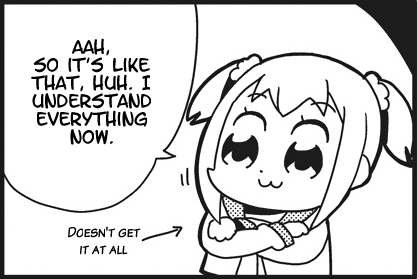My guide to learning Japanese beyond the beginner stage
| An average Japanese learner | |
|---|---|
| |
| Japanese is a hard language to learn. Who knew? | |
| Sociology | |
| Number of Kanji known | 3 |
| Anime seen | 293,487,234 |
| Study Characteristics | |
| Attempts to watch Terrace House | 2 |
| Money spent on textbooks | a lot |
| Gone to Japan? | obviously |
| Skills | |
| Katakana reading speed | 0.5 katakana per second |
| Confidence level | honestly too low |
I guess it makes sense why most guides online are for beginners. It's easy to do the first step into learning Japanese - learn hiragana! Learn katakana! Count to 10! Yay! But as soon as the building blocks are in place, everything becomes impossibly difficult. You want me to know HOW MANY kanji?? What the hell is a 'conditional'? Do you hate me? :(
Unfortunately for me, I'm trying to learn Japanese. I'm not an expert by any means, so take what I say with a healthy dose of skepticism. This is just what worked for me to get into an intermediate level. I will probably remain an intermediate student for a long, loooong time. I've also found that there's very little in the way of resources online for people who have finished Genki 2, and are ready for more complex learning. All the throwaway listicles just dispense helpful wisdom like "practice lots!" as if we hadn't already thought of that. So here's my take on things.
The main experience I've had is that money talks, and bullshit walks. It sucks, but money does wonders. Without a physical textbook and/or a wanikani subscription, learning Japanese is horrendously difficult. Yes, technically there are resources out there if you REALLY try - but the inconvenience puts a barrier between you and learning. Ideally, your learning should be as frictionless as possible to start. An actual, real-ass textbook you can write in does wonders. Wanikani is also brilliant, and the only way I'm able to remember kanji. At the very least, please consider buying a textbook to work from. I had a very good experience with Quartet 1 as the next step up from Genki 2. The workbook you can get alongside it is truly essential, because it drills grammar points into you and forces you to write kanji. My recommended textbook progression is as follows:*
Genki I (or the Minato website) --> Genki II --> Quartet I --> Quartet II
* Always with the workbook!
Things that are NOT useful
- Learning the 'top 500 used words': Seriously, why is this peddled as a good idea? You need to learn vocabulary in context. If you learn the word for fridge but then never use it, you'll just forget it. Instead, learn in context and you'll remember forever.
- Ignoring kanji: Sorry, buster. You need kanji. Even if you only want to speak and listen, Kanji are compounds. Just like a latin suffix or prefix, knowing kanji will help you understand words even if you've never learned them.
- Immersion learning from the start: This is one I really don't understand. How can anybody expect to just absorb language without any help? Even babies don't learn this way; we help them along by slowly teaching them individual words, reading to them, and playing educational games with them. Watching Naruto without subtitles won't teach you anything unless you're frantically flipping through a dictionary and grammar book every few seconds, which sounds miserable to me.
Using the skills you've learned up to this point
Reading my first book made me feel like an absolute idiot. Actually, reading anything in Japanese always makes me feel like an idiot. But practice really is the only way. You can buy manga in Japanese for VERY CHEAP (~500yen per volume, and I've found volumes are pretty huge) on BookWalker. This is also great because when manga is digital, you can really zoom in on troublesome kanji or furigana. I also read books from my local library, which means technically the first Japanese novel I read in full was a kid's Minecraft novel. High literature, indeed. Listening is another barrel of fish, but I've had semi-okay experiences with tokusatsu and slow songs. J-Dramas and reality tv like Terrace House are really hard, because everyone yaps at mach 5. Podcasts are also a good source of exposure, but I find it's no good listening to them in the background - I have to do nothing else and really focus on them.
